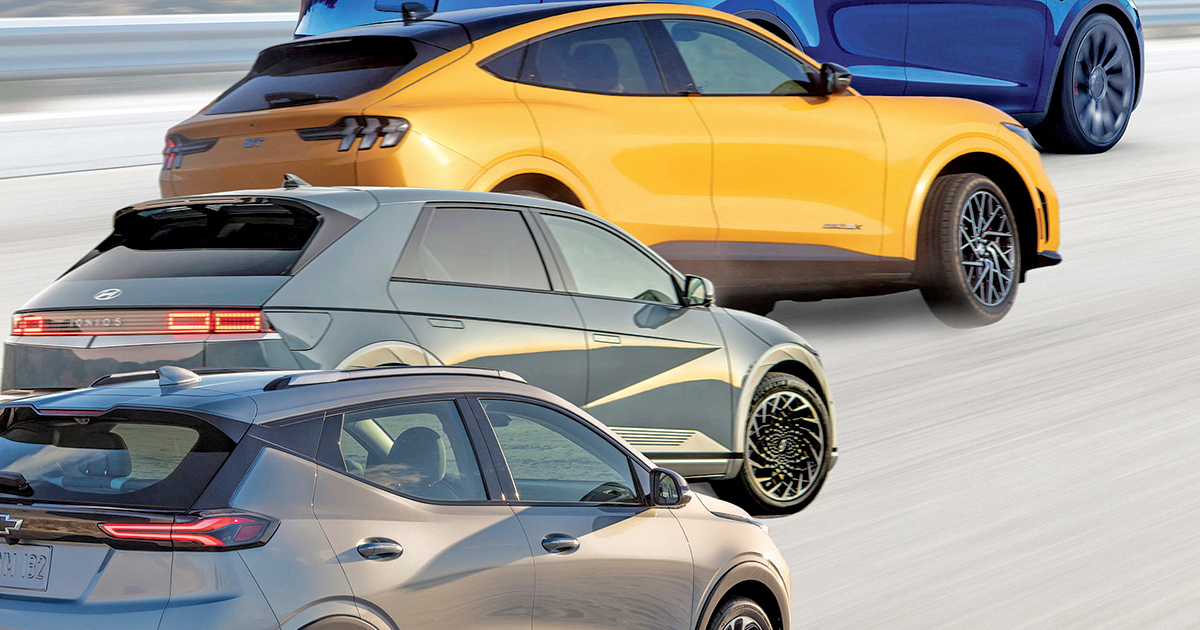Legacy auto companies are chipping away at Tesla’s formidable early-mover lead in electric vehicles as they introduce new models and ramp up production flows.
New registrations of full-electric vehicles in the U.S. surged among non-Tesla brands in the first seven months of the year. According to data from Experian, legacy automakers and other startups posted 56 percent EV growth through July, with 134,644 registrations among 22 brands for a combined 34 percent segment share.
Overall, EV registrations climbed 55 percent year over year. Through July, EVs accounted for a record 4.9 percent share of U.S. light-vehicle total registrations, compared with 2.6 percent a year ago.
For now, Tesla maintains a commanding grip with its four models, claiming nearly two-thirds share of new EV registrations through July. Four of the five most-registered EVs through July were Tesla crossovers and sedans.
But EV subscription startup Autonomy projects Tesla’s share of EVs sold in the U.S. will fall below 40 percent by the end of next year.
Autonomy chief analyst Jesse Toprak said Tesla’s dominance will be “increasingly challenged” as the industry brings the fight to the automaker with competitively equipped and priced EVs.
Automakers have introduced nearly 15 EV models in the U.S. since the beginning of 2021, with eight of them launched this year, according to Autonomy.
“One of the challenges other automakers are facing is supply chain issues, which should start to ease at the end of the year — something Tesla was able to withstand,” Toprak said.
While all automakers are increasing their prices, Tesla’s most significant sales are from its Model Y crossover, which tops $65,000.
“This could cause some buyers to look at other automakers in the future,” Toprak said.
Tesla dominates not just in EVs, but the entire luxury segment — regardless of fuel type.
Through July, the Texas automaker saw registrations climb 55 percent year over year as it fired up its second U.S. factory to pump out more vehicles, as some competitors struggled with output and quality.
Tesla’s new-vehicle registrations from January through July rose to 259,736 from 167,969 a year ago.
Meanwhile, new registrations for BMW — last year’s luxury segment leader — fell by 11 percent to 184,506 vehicles.
Mercedes-Benz saw a 10 percent slide to 159,803 vehicles, while Lexus tumbled 19 percent to 157,470 vehicles, according to Experian.
With its high-performance, software-focused vehicles, Tesla has “redefined the luxury category by convincing consumers it’s not just an automaker, but a technology company,” Toprak said. “The same envy people had for Mercedes or BMW owners is now associated with Tesla.”
Meanwhile, Ford and Hyundai Motor Group are battling for second place in the EV horse race.
Through July, the Ford brand came in second with 27,817 registrations, powered by the Mustang Mach-E, which soared 64 percent.
The arrival of the F-150 Lightning will drive the Blue Oval’s momentum in the second half of the year.
The battery-powered pickup had 2,679 registrations as of July, Experian said.
Hyundai Motor Group represents a formidable new competitor, as it has ambitions to bring four new EVs to the U.S. by the end of next year.
The Hyundai brand’s Ioniq 5 crossover, with 15,322 new registrations, accounted for 3.9 percent share of the U.S. EV market through July, tthe last full month before its EVs we’re made ineligible for tax credits under the Inflation Reduction Act. And after just six months on the market, the Kia EV6 captured 3.5 percent share, with 13,862 new registrations.
Hyundai took a page out of its historical playbook to offer premium features at mainstream prices for its EVs, said Ed Kim, president of AutoPacific.
The Ioniq 5 and EV6 feature 800-volt electrical architectures that allow for some of the industry’s fastest DC charging times.
“The latest Hyundai Motor Group EVs are some of the most competitive EVs in the marketplace right now that offer a combination of appealing EV features at reasonable price points that demonstrate just how serious the Korean automaker is about electrification,” Kim said.
Brands losing ground in the EV race this year include Chevrolet, which saw a 53 percent dive to 10,923 new registrations through July, while Volkswagen had a 16 percent decline to 7,065 new registrations. Porsche is also losing ground, dropping 19 percent to 4,917 new registrations, while Jaguar had a 65 percent slump to 279.

buy ivermectin uk – brand atacand carbamazepine 200mg us
purchase amoxil generic – buy cheap valsartan order combivent online
azithromycin order online – buy cheap tinidazole buy bystolic pills for sale
buy omnacortil pills for sale – omnacortil 20mg over the counter cheap prometrium 100mg
purchase lasix – purchase betamethasone without prescription3 generic betnovate 20gm
neurontin 100mg tablet – buy generic sporanox for sale buy itraconazole generic
augmentin 375mg cost – buy augmentin tablets duloxetine over the counter
purchase doxycycline pill – buy glucotrol 10mg sale brand glipizide 5mg
amoxiclav online order – duloxetine for sale buy generic duloxetine over the counter
buy generic rybelsus 14mg – levitra for sale order cyproheptadine 4mg online
buy zanaflex pill – order microzide pills order hydrochlorothiazide 25mg pills
buy cenforce 50mg generic – buy cheap glucophage purchase glycomet online
buy generic atorvastatin 40mg – order norvasc 10mg pill buy lisinopril without prescription
clarinex 5mg generic – cost desloratadine 5mg where can i buy dapoxetine
buy cytotec 200mcg – diltiazem oral diltiazem online
buy domperidone no prescription – order domperidone pill buy flexeril 15mg without prescription
buy warfarin 2mg – order metoclopramide 10mg generic oral cozaar 25mg
cheap nexium 40mg – topiramate 100mg tablet buy sumatriptan tablets
purchase meloxicam for sale – order mobic sale oral tamsulosin 0.2mg